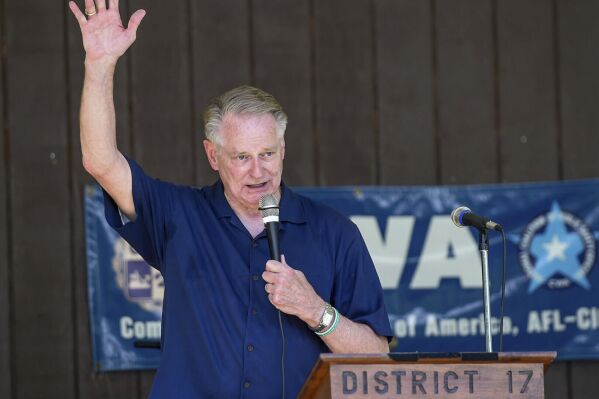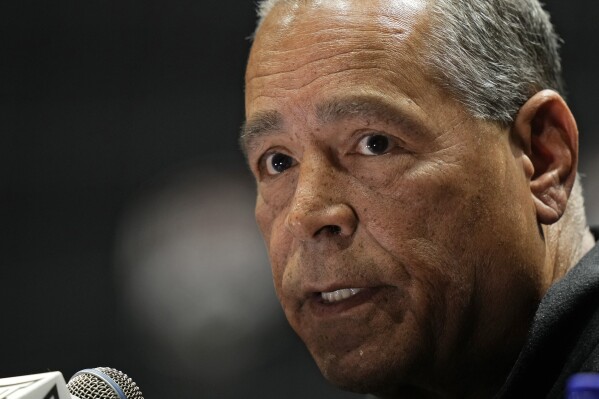West Virginia school system mandates religious training following revival assembly lawsuit
CHARLESTON, W.Va. (AP) — A West Virginia school district has passed a policy mandating annual religious freedom training as part of a lawsuit settlement after an evangelical preacher held a revival assembly during the school day in 2022 that some students were required to attend.
As part of a settlement finalized Thursday, Cabell County’s Board of Education’s policy makes clear that it is “not the province of a public school to either inhibit, or advance, religious beliefs or practices,” board lawyer Brian D. Morrison said in a statement to The Associated Press.
“Students must remain free to voluntarily express their individual religious beliefs, or lack thereof, as each student sees fit,” Morrison said.
Four families in West Virginia’s second-largest city of Huntington sued the district in February 2022, accusing the school system in the southwestern part of the state of having a systematic history of disregarding the religious freedom of its students and instituting Christian religious practices.
 Huntington Mayor Steve Williams files paperwork to raise money for West Virginia governor’s race
Huntington Mayor Steve Williams files paperwork to raise money for West Virginia governor’s race
 Houston’s Kelvin Sampson on the Big 12: ‘They’re all German shepherds, man. Where’s the Shih Tzus?’
Houston’s Kelvin Sampson on the Big 12: ‘They’re all German shepherds, man. Where’s the Shih Tzus?’
 After Huggins’ exit, interim coach Josh Eilert up for challenge with rebuilt lineup at West Virginia
After Huggins’ exit, interim coach Josh Eilert up for challenge with rebuilt lineup at West Virginia
The lawsuit said two Huntington High School teachers escorted their entire homeroom classes to an assembly hosted by evangelical preacher Nik Walker, who had been leading revivals in the Huntington area in recent weeks.
Students, including a Jewish student who asked to leave but was not permitted to do so, were instructed to close their eyes and raise their arms in prayer, according to the lawsuit. The teens were asked to give their lives over to Jesus to find purpose and salvation. Students said they were told that those who did not follow the Bible would “face eternal torment.”
During the assemblies, students and their families were encouraged to join evening services at a nearby church, where they could be baptized. The lawsuit followed a walkout at Huntington High School where more than 100 students left their classrooms chanting, “Separate the church and state” and “My faith, my choice.”
Morrison said the event was publicized in school announcements as a voluntary event hosted by the Fellowship of Christian Athletes, a student organization. The two teachers who brought their entire homeroom “were either confused or misunderstood,” he said.
He said the board already had a policy in place on religious freedom in school, but that it now includes more strongly worded language, a training requirement and other additions as a “safeguard against the occurrence of similar instances in the future.”
Morrison said the matter has been resolved and that the board has “no further comment on this issue at this time.”
The policy requires the district superintendent and principals “to attempt in good faith” to monitor school-sponsored activities to ensure policy compliance. Principals must report potential violations to the superintendent within seven days of discovering them. The superintendent is “authorized to investigate and take remedial action,” according to the policy.
As part of the settlement, the families will also receive up to $1 each from the district, and each student plaintiff will receive a $2,000 scholarship from the Freedom From Religion Foundation, the nonprofit that represented them in court. Nearly $175,000 in attorney fees were paid for by the board’s insurer.
Herman Mays, the father of one student forced to attend the revival, said the settlement brought about “meaningful policy changes and enforcement and training for staff and teachers on their constitutional responsibilities to ensure that what happened in Cabell public schools in February 2022 will not occur again.”
Disclaimer: The copyright of this article belongs to the original author. Reposting this article is solely for the purpose of information dissemination and does not constitute any investment advice. If there is any infringement, please contact us immediately. We will make corrections or deletions as necessary. Thank you.





